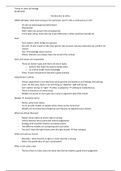Samenvatting
Summary NWI-BM073 - Trends in Stem Cell Biology - Alle lectures 2019
A summary of all the lectures of the course 'Trends in stem cell biology' of 2019. All lectures with the important figures and not only text from the slides but also extra notes from the extra explanation from the lecturer. A summary that is very useful!
[Meer zien]




